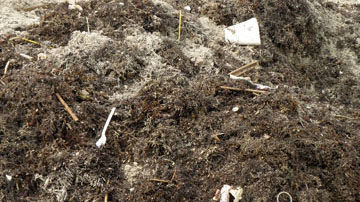
Earth Day
0
Free
Get out and do something nice for coral reefs and the rest of the planet!
Anywhere
- Finished 4/23/2022, 4:59:00 AM
Clean UpCommunityVolunteeringEcology & EnvironmentHealth & MedicineNature & OutdoorsOcean Water Marine
More Information
No matter where in the world you live, you can make simple changes in your daily habits to positively impact the ocean and its inhabitants. In a world where 40% of the world’s population lives within 60 miles of a coastline, we need to be conscious of the ways in which humans interact with marine ecosystems and what we can do to limit the negative impacts.
Here are ten simple ways you can make a difference in the marine ecosystem, no matter where you live!
- Bring your own: Take reusable shopping bags to stores, reusable utensils and straws to fast food restaurants, and reusable water bottles to events. By doing this, you help decrease the number of single-use plastics that might end up in the ocean, and be eaten by or entangle wildlife.
- Conserve water: Install low-flow toilets, faucets, and shower heads, fix leaks, turn off the tap while shaving, brushing your teeth or washing dishes, and sweep your sidewalks and driveways rather than hosing them off. The more water we pull from rivers, lakes, and streams, the less freshwater reaches the ocean. This can impact ocean salinity and the health of everything that lives there.
- Green your space: Fill your yard with plants that are naturally adapted to survive where you live. They require fewer pesticides and fertilizers to help them grow well and look nice. Plants also serve as natural filters for water, anchor soil in place, and reduce run-off. That means less water heading to storm drains, fewer chemicals getting into our waterways, and cleaner water for everyone.
- Pick up trash: If you drop trash, or see some on the ground, pick it up and dispose of it properly. Loose trash can easily get blown or washed into lakes or rivers, and eventually the ocean. When you pick up litter and place it in the appropriate receptacle, you keep our oceans clean and our marine life safe.
- Dispose responsibly: Recycle as much as possible, but know what is recyclable in your area and what isn’t. Don’t overlook the possibility of recycling light bulbs, batteries, electronics, and appliances, too. Compost fruit and vegetable scraps, coffee grounds, egg shells, and yard waste to keep them out of landfills. Take oil, tires, chemicals, cleaners, and medicines to appropriate disposal sites. Challenge yourself to see how little you can throw away!
- Choose sustainable seafood: Not only should you be conscientious about what you put into the ocean, but also consider what you take out. Before you eat seafood, check with NOAA’s FishWatch to learn what kinds of fish are sustainably caught or raised in your area. Avoid eating endangered fish, and consider invasive species like lionfish as an alternative!
- Reduce your electricity use: Reduce the amount of electricity you use by turning off or unplugging your television, lights, and appliances when they are not being used; adjust the thermostat a couple of degrees warmer in summer and cooler in winter; and, consider switching to renewable sources like solar or wind power, if they are available in your area. This will help limit the generation of carbon dioxide, which contributes to climate change and ocean acidification.
- Evaluate your transportation: Limit the amount of carbon dioxide associated with your lifestyle (your carbon footprint) by re-evaluating your transportation needs. Try carpooling or using public transportation for distant locations, and walking or biking for places close by. Hybrid or electric vehicles are another option to reduce carbon emissions.
- Reuse, repair, repurpose, or share: Give your goods a second life. Reuse things that are still in good condition by donating them or giving them to a friend or relative. Repair items that are broken instead of replacing them. Repurpose items by turning them into something new. Borrow or share items that don’t get used often. All of these habits help to reduce waste, which might otherwise end up in our ocean.
- Think before you buy: Put more thought into your purchases. How do they impact the environment? Are there alternatives?
Ticket Required: No
